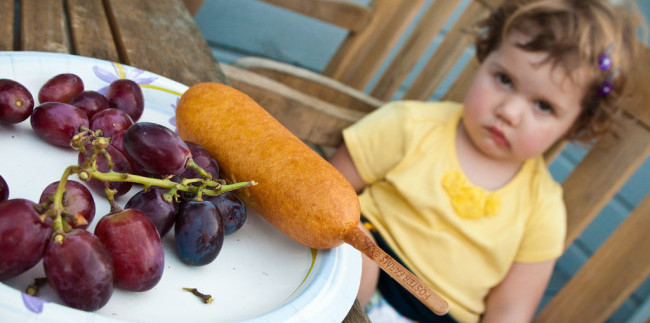 Whether your son insists on eating only hot dogs and corn for weeks on end or your daughter is on an egg and yogurt kick, picking eating in children is nothing new. Many parents may not even think twice about their child’s selective eating habits, assuming it’s a phase the child will likely will outgrow.
Whether your son insists on eating only hot dogs and corn for weeks on end or your daughter is on an egg and yogurt kick, picking eating in children is nothing new. Many parents may not even think twice about their child’s selective eating habits, assuming it’s a phase the child will likely will outgrow.
While this may be true in some cases, picky eating could be a warning sign of deeper psychological issues in others. A study published online in the journal Pediatrics found that children with even moderate levels of selective eating were more prone to psychological disorders such as anxiety, depression and attention deficit hyperactivity disorder (ADHD).
The Study
The study reviewed the eating habits and provided mental health assessments 917 children between the ages of 2 and 6 years old. In addition to linking picky eating with psychological disorders, the study found the severity of the selective eating habits tended to mirror the severity of the levels of mental health issues. The more severe the eating habits, the more severe the psychological disorders.
Compared to children that were not picky eaters, children with selective eating habits so severe that they won’t touch food outside the home were:
- Seven times more likely to suffer from social anxiety
- Two times more likely to suffer from depression
It’s important to note that the research showed a correlation between picky eating and psychological issues. It did not indicate that one caused the other or that getting rid of one would necessarily alleviate the other.
Not Just Stubborn Children
Picky eating may be much more complicated than initially believed, as noted by the study and The New York Times, not merely a habit of stubborn children to test what they can get away with from all-too-accommodating parents.
Selective eating instead points to a heightened sensitivity to the world, with picky eaters having more intense experiences when it comes to texture, taste and visual cues. A more intense external experience can, in turn, result in more intense feelings. That means picky eaters may be sensitive children who are more prone to anxiety or depression.
So What Can Parents Do?
It’s unfair to beat yourself up as if your child’s selective eating is somehow your fault. The way children interact with food is indicative of how they interact with the world around them. Those who are a bit hesitant about food, for example, may be a bit tentative or hesitant in real-life situations.
The best parents can do is serve as role models for healthy eating, choosing well-rounded food choices for their own snacks and meals. Forcing your child to eat different types of food is not a wise move, as a positive environment surrounding meal time is just as important as healthy eating habits.
Parents can certainly provide an abundance of healthy food choices, but it’s up to the child to decide if he or she is going to eat them or not. Time will tell if picky eating is a phase or a warning sign of underlying issues. Your job in the meantime is to make meals as harmonious as possible, whether it’s with hot dogs, corn, eggs, yogurt or you child’s other preference du jour.
SOURCES:
Photo Credit: CarbonNYC [in SF!] via Compfight cc





